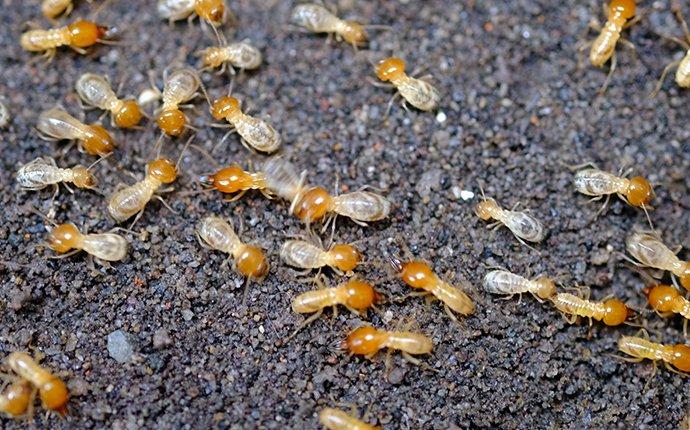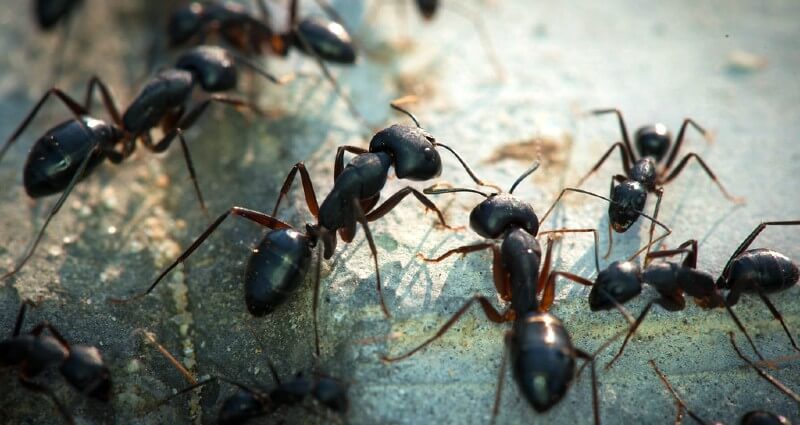Economical Ant Control Solutions: Keep Your Area Ant-Free
Economical Ant Control Solutions: Keep Your Area Ant-Free
Blog Article
Environmental Impact of Pest Control: Harmonizing Effectiveness With Sustainability
The ecological influence of insect control is an important concern that requires a delicate balance between accomplishing efficiency in making sure and taking care of pests sustainability of our ecological communities. As we aim to secure our plants, homes, and health from the dangers posed by pests, the methods we use can accidentally hurt the setting. From making use of unsafe chemicals that seep into our soil and water to the unintended repercussions on non-target types, the repercussions of standard insect control techniques are far-reaching. Nonetheless, there are arising techniques that provide expect an extra lasting strategy to pest management. These remedies not just aim to address the prompt parasite issues yet additionally consider the long-lasting health and wellness of our earth.
Dangerous Chemicals in Parasite Control
The usage of damaging chemicals in bug control poses considerable environmental and health threats that call for mindful consideration and mitigation methods. Insecticides, herbicides, and chemicals are frequently used to remove bugs, but their extensive application can lead to unintentional effects. These chemicals can contaminate dirt, water sources, and the air, influencing not only the targeted parasites yet likewise beneficial insects, wildlife, and human beings.

To resolve these dangers, integrated bug monitoring (IPM) methods are being promoted as a much more sustainable choice. IPM entails a mix of methods such as organic control, habitat adjustment, and the targeted use chemicals as a last hope (ant control cornelius nc). By adopting an all natural strategy to pest control, we can decrease the ecological and health impacts connected with unsafe chemicals while efficiently managing pest populations
Influence on Non-Target Types
Thinking about the unintended effects of bug control approaches, the effect on non-target types is a critical element that requires comprehensive analysis. While pest control procedures intend to target certain insects, various other organisms in the community might be inadvertently influenced. Non-target types, consisting of advantageous pests, birds, creatures, and also plants, can experience straight or indirect damage from chemical applications or biological control approaches.
Chemicals can have sub-lethal or deadly results on non-target species. For instance, insecticides designed to fight a particular bug bug might harm pollinators like bees or natural predators such as ladybugs. Furthermore, chemical residues can collect in the setting, impacting non-target organisms over time. Biological control agents, if not species-specific, can posture threats to unplanned targets, disrupting the ecological equilibrium.
To mitigate the impact on non-target types, integrated parasite administration (IPM) strategies that highlight an all natural method to pest control are recommended. These methods prioritize making use of environmentally friendly techniques, lessening harm to useful organisms while successfully taking care of pest populations. Carrying out comprehensive risk evaluations and keeping an eye on the end results of parasite control initiatives are essential action in securing non-target species and advertising total environment health.
Soil and Water Contamination
Unintended ecological consequences of insect control approaches extend past influencing non-target species, with substantial effects for soil and water contamination - ant control services. Chemicals, herbicides, and chemical fertilizers made use of in insect control can seep into the dirt and infect groundwater, presenting a risk to both marine and earthbound ecosystems.
Water contamination is another important concern connected with bug control techniques. To minimize dirt and water contamination from insect control tasks, integrated pest monitoring techniques that focus on sustainability and lessen chemical inputs are vital.
Air Contamination From Chemical Usage
Exposure to airborne chemicals throughout agricultural applications presents a considerable concern for air pollution control actions. In addition, chemical drift, where chemicals are brought by the wind to unintended locations, can lead to the contamination of neighboring communities and water bodies.

Methods for Lasting Parasite Control
In the realm of farming practices, implementing sustainable parasite control approaches is paramount for maintaining environmental balance and guarding plant returns. Sustainable parasite control stresses the use of eco-friendly approaches to take care of parasite populaces properly while reducing harm to non-target microorganisms and communities. Integrated Parasite Administration (IPM) is a commonly embraced approach that incorporates biological, social, physical, and chemical control techniques to attain long-lasting bug administration services.
One secret method in lasting pest control is promoting biodiversity within agroecosystems. By enhancing natural enemies of bugs, such as parasitoids and predators, farmers can decrease the demand for artificial chemicals. Plant turning and diversity are likewise reliable methods to interrupt pest life cycles and produce less positive conditions for bugs to prosper. In addition, making use of pest-resistant plant ranges and using techniques like catch chopping can help in reducing pest pressure without counting heavily on chemical interventions. Inevitably, by incorporating these lasting pest control approaches, farmers can accomplish an equilibrium between pest monitoring efficiency and ecological stewardship.
Conclusion
In conclusion, the ecological effect of pest control methods have to be carefully considered to stabilize performance with sustainability. Harmful chemicals utilized in bug control can bring about soil and water contamination, air pollution, and damage non-target varieties - ant control. It is important to implement sustainable bug control strategies to reduce these adverse effects on the atmosphere and promote a much healthier environment for future generations
By adopting a holistic approach to pest control, we can minimize the websites environmental and health and wellness influences linked with harmful chemicals while efficiently handling pest populations.

To minimize the air pollution triggered by chemical use, it is crucial to take on incorporated pest administration approaches that prioritize the use of non-chemical insect control techniques, such as plant turning, all-natural killers, and resistant crop ranges. Sustainable pest control stresses the usage of eco pleasant techniques to manage insect populations properly while reducing injury to non-target organisms and ecological communities. Integrated Insect Monitoring (IPM) is a widely embraced strategy that combines biological, cultural, physical, and chemical control techniques to achieve long-term bug management options.
Report this page